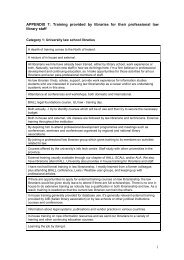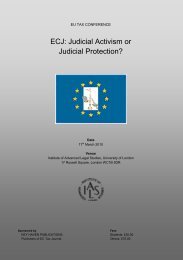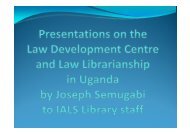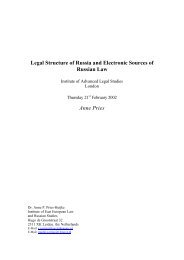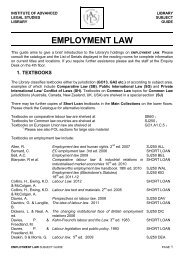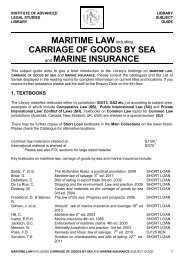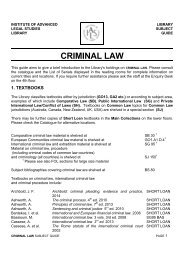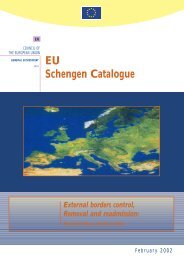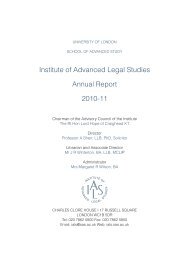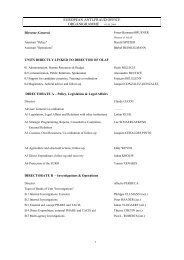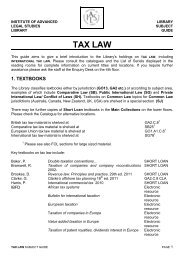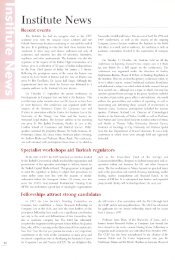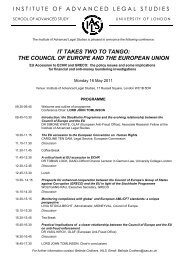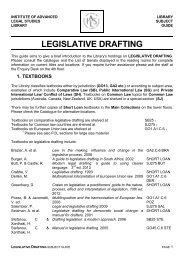a thesis - Institute of Advanced Legal Studies
a thesis - Institute of Advanced Legal Studies
a thesis - Institute of Advanced Legal Studies
You also want an ePaper? Increase the reach of your titles
YUMPU automatically turns print PDFs into web optimized ePapers that Google loves.
ENFORCEABILITY OF EXPRESS TRUSTS. 57<br />
4. On the marriage <strong>of</strong> A. with B., A.'s property is settled upon<br />
B. and A. successively for life, remainder to the children <strong>of</strong> the<br />
marriage, remainder in default <strong>of</strong> children to A. absolutely if she<br />
survives B., but if she dies in his lifetime, as she may by will<br />
appoint, remainder in default <strong>of</strong> appointment to her next <strong>of</strong> kin,<br />
excluding her husband. A. and B. cannot revoke the settlement<br />
as against the next <strong>of</strong> kin, even though there be no issue <strong>of</strong> the<br />
marriage and no possibility <strong>of</strong> issue. Paulv. Paul (1882), 20 Oh.<br />
D. 742.<br />
Where the Settlor has declared Himself, or the Person in whose<br />
control the Property is to be, a Trustee.<br />
1. A. by voluntary settlement covenants to surrender copyholds<br />
to B., 0. and D. on certain trusts, and that until the surrender<br />
is made she will stand possessed there<strong>of</strong> in trust for B., C. and D.<br />
This constitutes A. a trustee upon the trusts <strong>of</strong> the settlement.<br />
Steele v. Waller (1860), 28 Beav. 466.<br />
2. The legal estate in fee in lands is vested in A. in trust for B.<br />
B. signs a document addressed to A., directing that the lands and<br />
other property shall after his death be held for the benefit <strong>of</strong> certain<br />
persons. This is an enforceable trust. Tierney v. Wood (1854),<br />
19 Beav. 330.<br />
(b) Imperfect Voluntary Trusts.—" In order to render the<br />
[voluntary] settlement binding," says Lord Justice Turner in<br />
Milroy v. Lord (1862, 4 De GK F. & J. at p. 274), "one or other<br />
<strong>of</strong> the modes [above mentioned] must, as I understand the law <strong>of</strong><br />
this court, be resorted to, for there is no equity in this court to<br />
perfect an imperfect gift. The cases, I think, go further to this<br />
extent, that if the settlement is intended to be effectuated by one<br />
<strong>of</strong> the modes to which I have referred, the court will not give<br />
effect to it by applying another <strong>of</strong> those modes. If it is intended<br />
to take effect by transfer, the court will not hold the intended<br />
transfer to operate as a declaration <strong>of</strong> trust, for then every imperfect<br />
instrument would be made effectual by being converted into a<br />
perfect trust."<br />
(See also Colman v. Barrel (1789), 1 Ves. 50 ; Jefferys v. Jefferys<br />
(1841), Or. & Ph. 141; Marler v. Tommas (1873), L. E. 17 Eq. 8 ;



